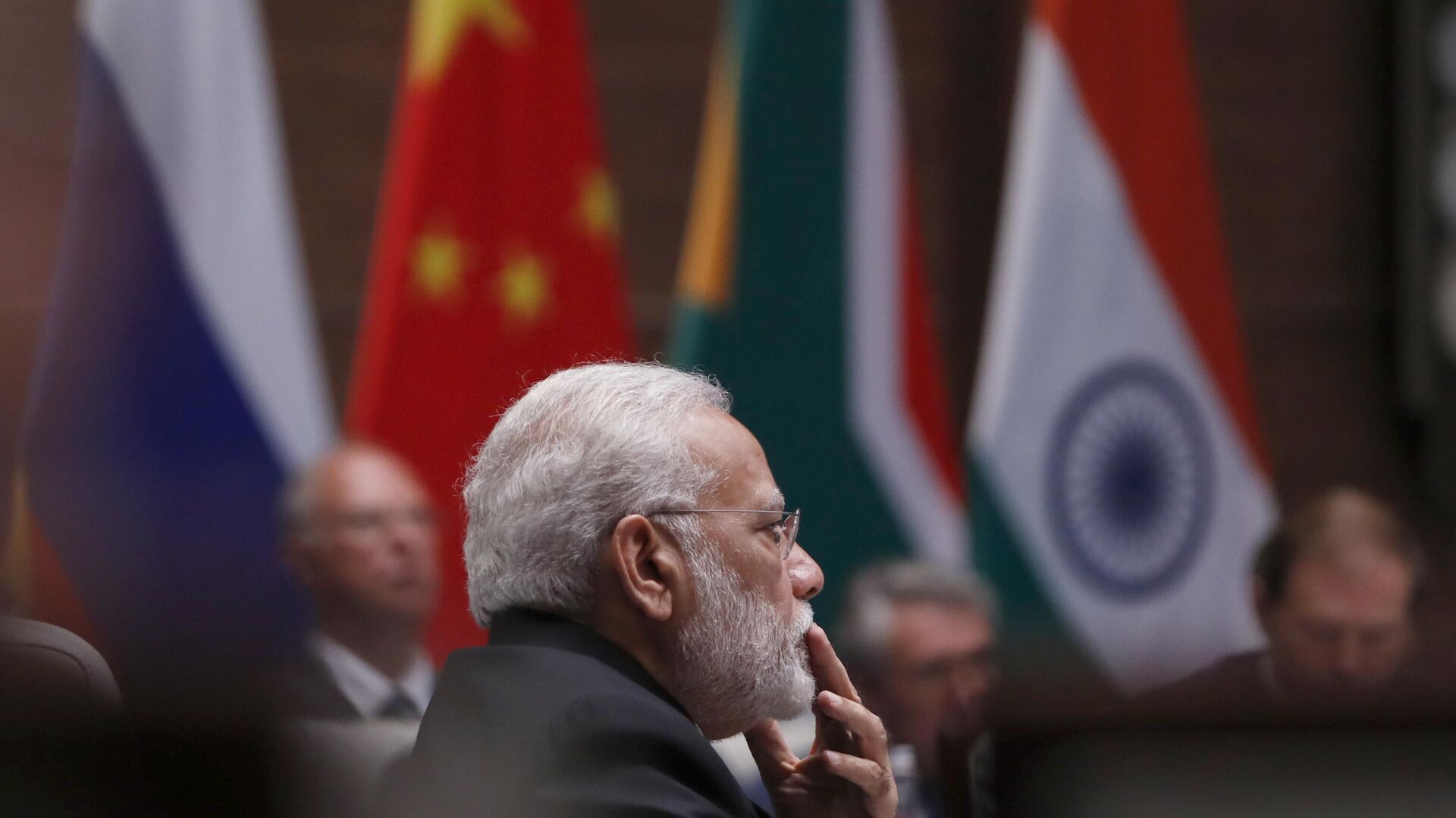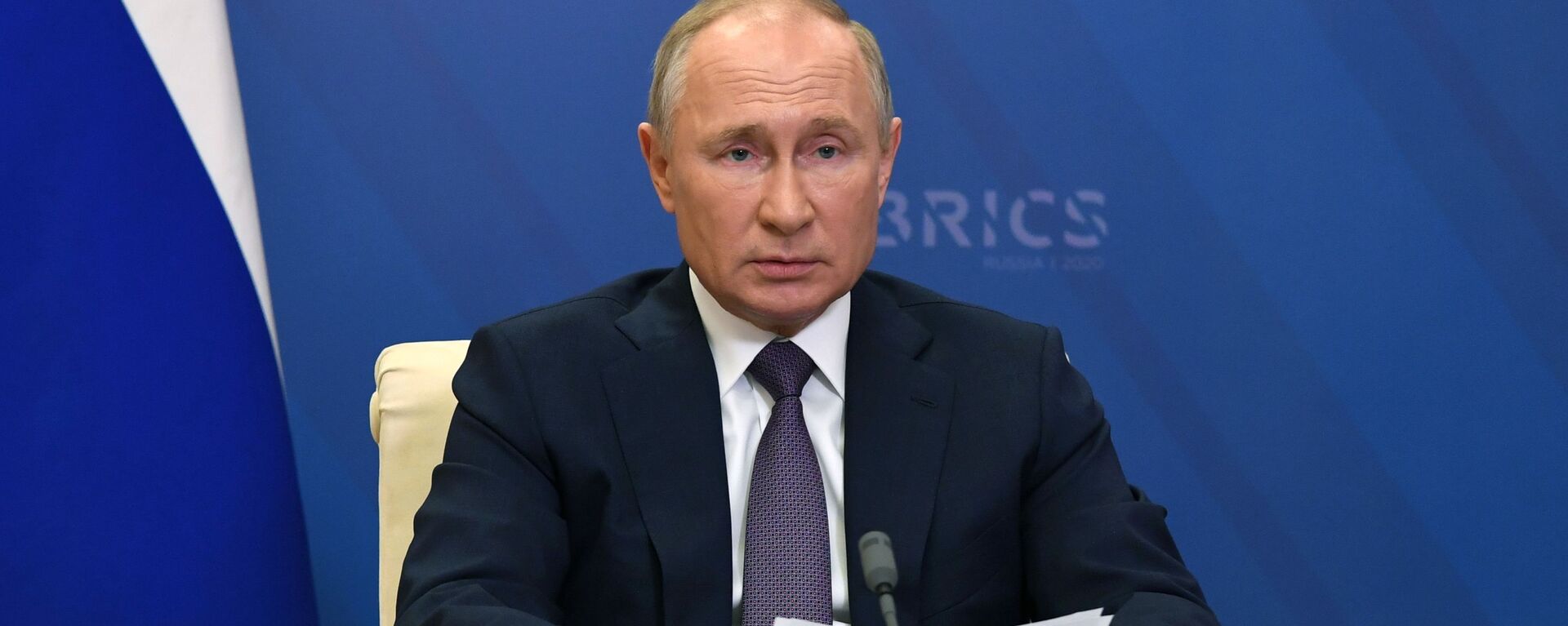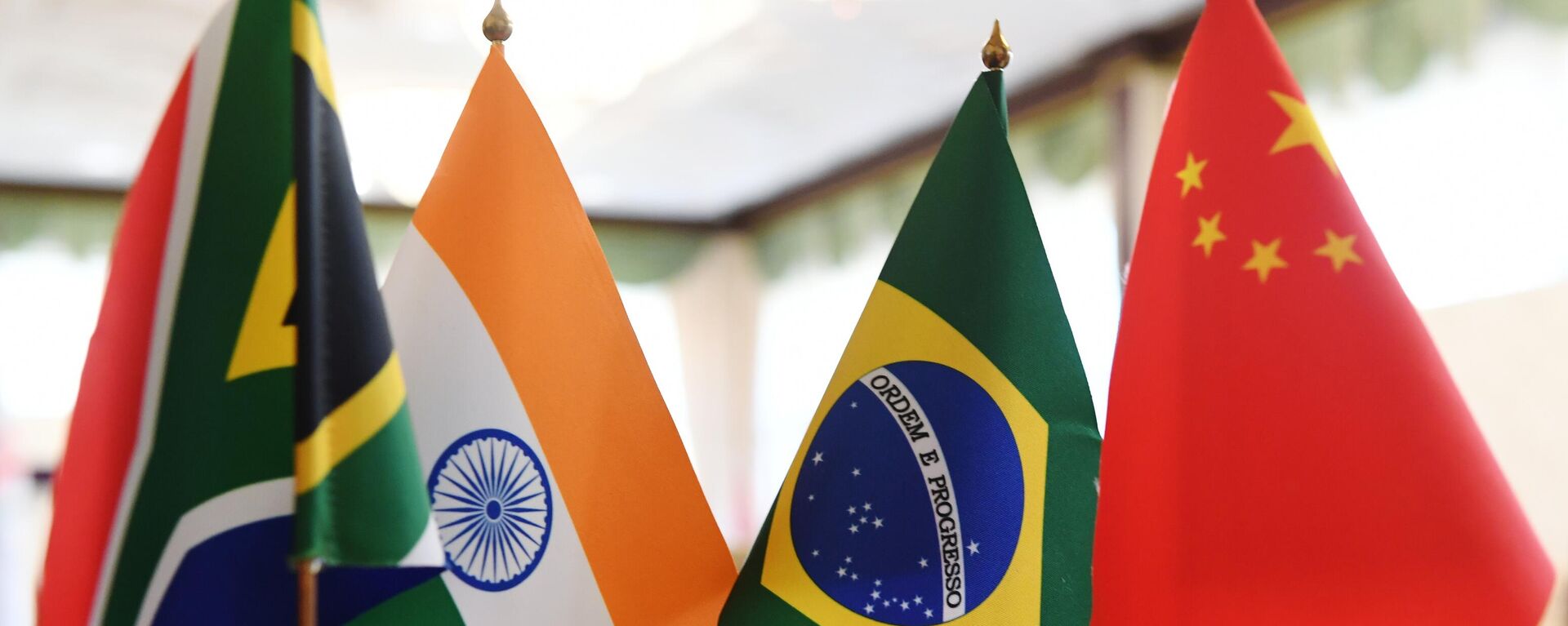https://sputniknews.in/20230720/slow-and-considerate-expansion-will-add-heft-to-brics-ex-envoy-says-3112089.html
‘Slow and Considerate Expansion’ Will Add Heft to BRICS, Ex-Envoy Says
‘Slow and Considerate Expansion’ Will Add Heft to BRICS, Ex-Envoy Says
Sputnik India
The BRICS nations—Brazil, Russia, India, China and South Africa—must focus on “slow and considerate expansion” based on well-defined criteria to enlist new members, experts have told Sputnik.
2023-07-20T20:21+0530
2023-07-20T20:21+0530
2023-08-03T11:11+0530
sputnik opinion
brics
india
russia
china
south africa
new development bank (ndb)
us
dedollarisation
un reform
https://cdn1.img.sputniknews.in/img/07e7/06/0f/2496453_0:321:3071:2048_1920x0_80_0_0_164936d140b8869bc8fa57e57ea75236.jpg
The BRICS nations—Brazil, Russia, India, China and South Africa—must focus on “slow and considerate expansion” based on well-defined criteria to enlist new members, experts have told Sputnik.Trigunayat noted that the five-nation group has been able to “consolidate its gains despite intra member differences” - a reference to the border differences between India and China, which are the organization’s biggest economies and the most populous nations.Major General (retired) Shashi Bhushan Asthana, an Indian Army veteran and the Director of New Delhi-based think tank United Service Institution (USI) of India, agreed on the need for having a “strict criterion”.The Indian military veteran said that the “ineffectiveness” of the United Nations (UN) in heeding to concerns of the low and middle-income nations was the chief reason for BRICS and other non-Western groupings’ growing popularity.He said that a larger BRICS membership base would advance the vision of a “multipolar world”.The remarks come as BRICS’ foreign ministers hold a key meeting on Thursday to deliberate on the criteria for grouping’s expansion, amid an interest by at least 19 countries to join the grouping.The South African Presidency said during a BRICS sherpa and sous sherpa meeting on 5 July that the foreign ministers will make their recommendations on the expansion process to the country leaders in the lead-up to the BRICS summit in August.Indian foreign minister S. Jaishankar said after the BRICS foreign ministers meeting in Cape Town last month that the expansion of the grouping was a “work in progress”.BRICS Challenges US’ Global Hegemony, Expert SaysAsthana stressed the fact that a growing interest in multilateral groupings such as BRICS as well as in regional mechanisms like the Shanghai Cooperation Organization (SCO) posed a direct challenge to the Washington’s post-World War II “global hegemony”.Asthana said that the ongoing drive by the BRICS-backed New Development Bank (NDB) to enrol new members was also a step in eroding the “financial hegemony” of the US dollar.He noted that the US has held a sway over the global financial architecture since World War II due to the internationalization of the US dollar.Asthana said that although there were certain “divergences” on the matter of introducing a common BRICS currency, he underlined that the BRICS states have nevertheless expressed an “intention” in that direction.According to a British consultancy, BRICS nations this year overtook the G7 club of rich nations in the combined Gross Domestic Product (GDP) (based on Purchasing Power Parity).Around 41 per cent of the global population lives in BRICS countries, more than in the G7 countries.
https://sputniknews.in/20230720/putin-to-take-part-in-brics-summit-on-august-23-3097736.html
https://sputniknews.in/20230531/what-is-brics-and-why-everyone-wants-to-join-the-grouping-2247768.html
india
russia
china
south africa
us
Sputnik India
feedback.hindi@sputniknews.com
+74956456601
MIA „Rossiya Segodnya“
2023
Dhairya Maheshwari
https://cdn1.img.sputniknews.in/img/07e6/0c/13/138962_0:0:641:640_100x100_80_0_0_2cb44360dbcdf6d84bf4b299cd045917.jpg
Dhairya Maheshwari
https://cdn1.img.sputniknews.in/img/07e6/0c/13/138962_0:0:641:640_100x100_80_0_0_2cb44360dbcdf6d84bf4b299cd045917.jpg
News
en_IN
Sputnik India
feedback.hindi@sputniknews.com
+74956456601
MIA „Rossiya Segodnya“
Sputnik India
feedback.hindi@sputniknews.com
+74956456601
MIA „Rossiya Segodnya“
Dhairya Maheshwari
https://cdn1.img.sputniknews.in/img/07e6/0c/13/138962_0:0:641:640_100x100_80_0_0_2cb44360dbcdf6d84bf4b299cd045917.jpg
brics gdp, brics summit, brics expansion, putin brics, putin brics summit, ndb brics, ndb members
brics gdp, brics summit, brics expansion, putin brics, putin brics summit, ndb brics, ndb members
‘Slow and Considerate Expansion’ Will Add Heft to BRICS, Ex-Envoy Says
20:21 20.07.2023 (Updated: 11:11 03.08.2023) The foreign ministers of BRICS’ nations hold an “extraordinary” meeting via video-conferencing on Thursday, according to the Russian foreign ministry.
The BRICS nations—Brazil, Russia, India, China and South Africa—must focus on “slow and considerate expansion” based on well-defined criteria to enlist new members, experts have told Sputnik.
“Slow and considerate expansion may add to the heft rather than following a big-bang theory approach which might make it unmanageable like other multilateral or plurilateral organizations. Hence, it is important to have a credible criterion for inclusion and strengthening of the organisation,” remarked Anil Trigunayat, India’s former ambassador to Jordan and Libya.
Trigunayat noted that the five-nation group has been able to “consolidate its gains despite intra member differences” - a reference to the border differences between India and China, which are the organization’s biggest economies and the most populous nations.
“In the changing global scenario, it has attracted a large number of countries as an anchor as a new financial global architecture emerges,” Trigunayat remarked.
Major General (retired) Shashi Bhushan Asthana, an Indian Army veteran and the Director of New Delhi-based think tank United Service Institution (USI) of India, agreed on the need for having a “strict criterion”.
“There definitely should be a strict criterion while enrolling new members. Anybody and everybody shouldn’t be allowed to become a BRICS member,” Asthana said.
The Indian military veteran said that the
“ineffectiveness” of the United Nations (UN) in heeding to concerns of the low and middle-income nations was the chief reason for BRICS and other non-Western groupings’ growing popularity.
“The Permanent members of the UN Security Council are a divided lot and the drive to expand the UNSC member base has been stuck for years,” Asthana noted.
He said that a larger BRICS membership base would
advance the vision of a “multipolar world”.
The remarks come as BRICS’ foreign ministers hold a key meeting on Thursday to deliberate on the criteria for grouping’s expansion, amid an interest by at least 19 countries to join the grouping.
The South African Presidency said during a
BRICS sherpa and sous sherpa meeting on 5 July that the foreign ministers will make their recommendations on the expansion process to the country leaders in the lead-up to the BRICS summit in August.
Indian foreign minister S. Jaishankar said after the BRICS foreign ministers meeting in Cape Town last month that the expansion of the grouping was a “work in progress”.
Jaishankar said that there were several aspects to the expansion process, including bolstering cooperation among the existing members, looking an engagements with non-BRICS members and the “appropriate format” for an expansion.
BRICS Challenges US’ Global Hegemony, Expert Says
Asthana stressed the fact that a growing interest in multilateral groupings such as BRICS as well as in regional mechanisms like the Shanghai Cooperation Organization (SCO) posed a direct challenge to the Washington’s post-World War II “global hegemony”.
“Of course, all these developments indicate that the world is moving towards multipolarity. Any global hegemon, be it the US or other country, is bound to get challenged,” he remarked.
Asthana said that the ongoing drive by the BRICS-backed New Development Bank (NDB) to enrol new members was also a step in eroding the “financial hegemony” of the US dollar.
He noted that the US has held a sway over the global financial architecture since World War II due to the internationalization of the US dollar.
“If BRICS countries come out with their own currency or decide to use a common currency, it would certainly have a negative influence on the US dollar.
Asthana said that although there were certain “divergences” on the matter of introducing a common BRICS currency, he underlined that the BRICS states have nevertheless expressed an “intention” in that direction.
According to a British consultancy, BRICS nations this year overtook the G7 club of rich nations in the combined Gross Domestic Product (GDP) (based on Purchasing Power Parity).
Around 41 per cent of the global population lives in BRICS countries, more than in the G7 countries.




